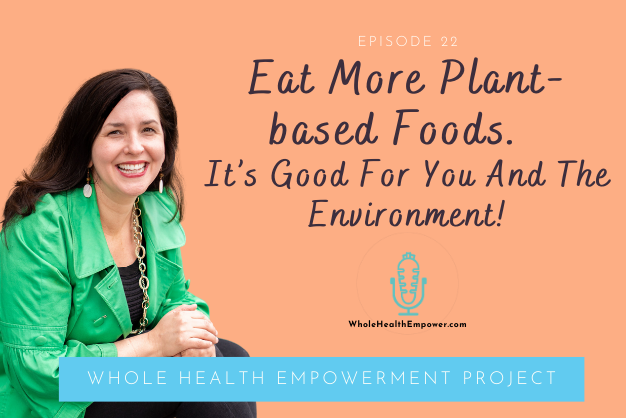Along my career as a dietitian, I have people who have taken this approach to eating for a variety of reasons including health, religious, environmental, and affordability concerns. I know the topic of plant-based eating can be a bit confusing, so I wanted to spend some time today talking about it, benefits of eating to your health and the health of the environment, and ways to get you started.
Episode Resources:
Eating a plant-based diet is good for YOU and the environment. Tell me more!
By: Tricia Stefankiewicz, RD
I wanted to spend some time today, talking about vegetarian and plant-based diets. Along my career as a dietitian, I have people who have taken this approach to eating for a variety of reasons including health, religious, environmental, and affordability concerns. I know the topic of plant-based eating can be a bit confusing, so I wanted to spend some time today talking about it, benefits of eating to your health and the health of the environment, and ways to get you started.
As a dietitian, I am often asked about plant-based diet regarding weight loss because of its high fiber and nutrient content. But eating more plant-based foods have a multitude of health benefits for both you and the environment that I thought was important to share with you today.
What is a plant-based diet?
Typically consists of eating foods such as whole grains, nuts, seeds, oils, legumes, beans, fruits, and veggies. This way of eating can also include consuming some meats such as fish, poultry, seafood, depending on the kind of plant-based diet or vegetarian diet you are following.
Are eating patterns vary and can be as extreme as eating mostly meat or avoiding meat and meat products altogether. But there are eating patterns also that fall in between these two.
What are some of the vegetarian diet types?
- Semi-vegetarian or flexitarian: occasional meat, poultry, fish, and seafood. Mostly includes eggs, and dairy rich foods.
- Pescatarian – no red meat or poultry. Instead has eggs, dairy foods, fish, and seafood
- Lacto-ovo Vegetarian – no meat, poultry, fish, or seafood. Instead has eggs, dairy foods, and butter
- Vegan – no meat, poultry, fish, eggs and dairy products — and foods that contain these products.
- Depending on the type of vegetarian you are, you may need supplementation to assist you Will need Vitamin B12 supplementation and B12 is only found in animal products.
What are the health benefits of eating a vegetarian diet?
Vegetarian diet, and diets high in plant products, have been shown to decrease risk of DM and metabolic syndrome development, reduced risk of some cancers, lower risk for coronary heart disease, and lower all-cause mortality. Other benefits: lower BMI, improved blood pressure, cholesterol, and triglyceride levels, decrease in inflammatory markers.
What is the environmental toll of eating a high meat diet?
In general, animal products use more of the earth’s resources, including water and carbon, to produce than plant food items do. When the consumer decides to eat more animal products, beef, the crops that would normally occupy this land are now cleared for cattle to graze on. As Cows eat and digest food, they release a high amount of methane which is considered dangerous to the environment and contributes to global warming and climate change. Meat products also have a large water footprint. Beef by pound requires much more water content to produce than a plant-based food. One study suggests that 1 lb. of beef requires 2,000 to 8,000 gallons of water vs 1 lb. of tofu requires 302 gallons of water to produce. Overall, plant-based foods require much less water to produce. This translates into reduced carbon emissions (methane and carbon dioxide), reduced water use, and less overall pollution. The changes improve global warming and overall environmental health.
What small changes can you make to improve both your health and the health of the environment?
Decrease the amount of meat you consume weekly, beef products. One of the ways to start introducing more plant-based food is by experimenting with new plant-based recipes and eating meat free on Mondays.
Meatless Monday is a global campaign started in 2003 to encourage people to decrease the amount of meals eaten in our diet to improve the health of the individual and the environment. Meatless Monday night meal ideas:
Risotto, bean and risotto burritos, eggplant, Veggie/Bean Burgers, cauliflower fried rice with tofu, veggie lasagna, veggie bean enchiladas, tofu stir fry, spaghetti with spinach and cannellini beans, veggie chili
Change the serving size of meat you consume, think of it more as a side dish than the whole plate
Decreasing the amount of meat you eat isn’t just good for you, but it’s also food for the environment. Why wouldn’t you eat less meat if you knew that? I’m not advocating for you to give up meat altogether and I certainly like the occasional meatballs, bacon, and pepperoni on my pizza. However, having a more balanced diet is an opportunity to improve both human and environmental health. It’s about finding a way to do this that works for you and your family.
This journey to better whole health is not about being perfect, it’s about being 1% better each day. I don’t have it figured out, but I know I can do a better job than I am doing now. You may feel that way too. It’s not about being perfect, it’s about being 1% better each day. Be kind to yourself friends. See you next week.

